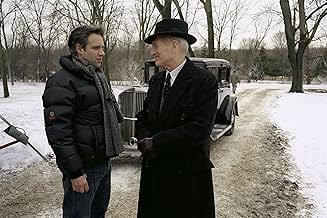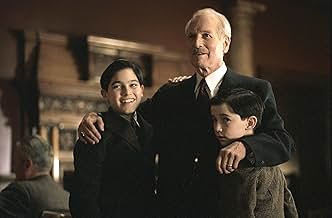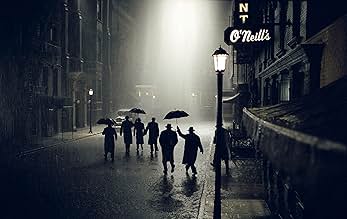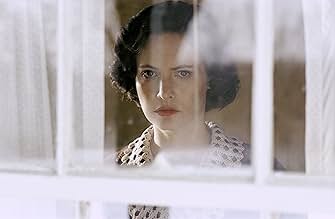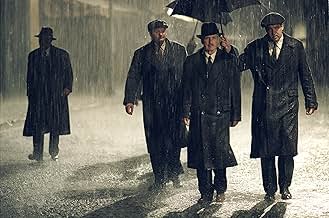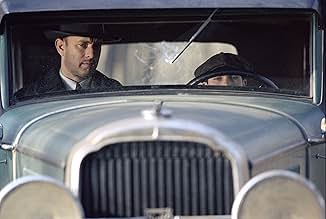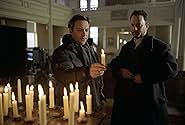El hijo de un mafioso es testigo de un asesinato, lo que obliga a él y a su padre a escapar por un camino de redención y venganza.El hijo de un mafioso es testigo de un asesinato, lo que obliga a él y a su padre a escapar por un camino de redención y venganza.El hijo de un mafioso es testigo de un asesinato, lo que obliga a él y a su padre a escapar por un camino de redención y venganza.
- Dirección
- Guionistas
- Elenco
- Ganó 1 premio Óscar
- 23 premios ganados y 82 nominaciones en total
Stephen P. Dunn
- Finn McGovern's Henchman
- (as Stephen Dunn)
- Dirección
- Guionistas
- Todo el elenco y el equipo
- Producción, taquilla y más en IMDbPro
Opiniones destacadas
Let me start this off by saying this movie is beautiful. By a technical standpoint, perfection was achieved. I'll remember this movie as proof of example; outstanding direction/cinematography cannot fully compensate for a lackluster plot.
On paper, the plot is an average set up. Relationships in a crime family are tested, but none are ever stretched too far. In this sense it feels somewhat familiar and not very original.
But what does keep this movie from being average-blah, is the care put into EVERY shot. I give a huge amount of credit to the cinematographer. A good amount of noticeable techniques were used. I particularly liked one symmetrical pillar shot that used a zoom in dolly in trick. A slight variation of the Vertigo introduced, zoom in dolly out.
But with all of these wonderful shots I noticed something. There was so much technically stunning camera work, I found myself completely drawn out of the story. Was this done intentionally? To some degree I think so. This nicely compliments the dark and rainy 1930's settings.
Noticing this I tried to put more thought into the plot. There basically was none. The characters were cold and lacked development. Any dialog is important and used sparingly. I couldn't stop myself from drawing comparison to The Godfather. What Road to Perdition lacks is any underlying intensity between the characters. I never feel like they were a tight-knit family and do feel as if I'm simply watching characters play their parts. The story has no poetry and feels more like a collection of parts that aren't worth its sum.
I appreciate it in its stunning visuals, but once the credit rolled I felt nothing. And I find no reason to return back to it.
On paper, the plot is an average set up. Relationships in a crime family are tested, but none are ever stretched too far. In this sense it feels somewhat familiar and not very original.
But what does keep this movie from being average-blah, is the care put into EVERY shot. I give a huge amount of credit to the cinematographer. A good amount of noticeable techniques were used. I particularly liked one symmetrical pillar shot that used a zoom in dolly in trick. A slight variation of the Vertigo introduced, zoom in dolly out.
But with all of these wonderful shots I noticed something. There was so much technically stunning camera work, I found myself completely drawn out of the story. Was this done intentionally? To some degree I think so. This nicely compliments the dark and rainy 1930's settings.
Noticing this I tried to put more thought into the plot. There basically was none. The characters were cold and lacked development. Any dialog is important and used sparingly. I couldn't stop myself from drawing comparison to The Godfather. What Road to Perdition lacks is any underlying intensity between the characters. I never feel like they were a tight-knit family and do feel as if I'm simply watching characters play their parts. The story has no poetry and feels more like a collection of parts that aren't worth its sum.
I appreciate it in its stunning visuals, but once the credit rolled I felt nothing. And I find no reason to return back to it.
`Road to Perdition' is a rocky road of revenge and reconciliation, punctuated by some gorgeous Conrad Hall cinematography. Tom Hanks is a 1930's mob hit man whose 12 year-old son sees him commit a murder. The rest of Director Sam Mendes' (`American Beauty') film is the boy's coming to terms with that knowledge. Paul Newman plays a `godfather,' a father to his errant son and like a father to Hanks.
Laced throughout are 3 father-son relationships, which seem to move toward the violent ends reserved for mobsters. Hanks' son is ambivalent about his dad, whom he seems to adore yet hold accountable for his crimes. Newman's son is like Sonny Corleone, too loose to be in charge and no heir apparent; Hanks owes his lifestyle to Newman-all these relationships are subsumed by the business needs of the larger organization.
This is noir with a dark palette, costuming in clothes metaphorically heavy, and sounding often as stylized and minimal as the murders Hanks commits. `Road to Perdition' lacks the grandeur of Coppola's `Godfather' epic, but it succeeds in evoking an old-testament judicial system where eye meets eye and tooth savages tooth. The revenge motif is too dominant to let the film rest on the promising father-son motif.
Hanks' son learns about morality and decides about following in his father's footsteps. Hanks gives another controlled performance, and Paul Newman lets us know there is room for one more powerful screen godfather.
Laced throughout are 3 father-son relationships, which seem to move toward the violent ends reserved for mobsters. Hanks' son is ambivalent about his dad, whom he seems to adore yet hold accountable for his crimes. Newman's son is like Sonny Corleone, too loose to be in charge and no heir apparent; Hanks owes his lifestyle to Newman-all these relationships are subsumed by the business needs of the larger organization.
This is noir with a dark palette, costuming in clothes metaphorically heavy, and sounding often as stylized and minimal as the murders Hanks commits. `Road to Perdition' lacks the grandeur of Coppola's `Godfather' epic, but it succeeds in evoking an old-testament judicial system where eye meets eye and tooth savages tooth. The revenge motif is too dominant to let the film rest on the promising father-son motif.
Hanks' son learns about morality and decides about following in his father's footsteps. Hanks gives another controlled performance, and Paul Newman lets us know there is room for one more powerful screen godfather.
I f you thought Sam Mendes' first film, the much heralded American BEAUTY was a movie with style to spare, wait until you see his highly anticipated second effort, the unrelentingly grim 30's gangster melodrama ROAD TO PERDITION. Some critics have hailed this new movie as a worthy successor to THE GODFATHER, a rash judgment made by several reviewers taken with Mr. Mendes' extraordinary technical prowess. If the mechanics of movie making are what make a picture great, then yes, ROAD TO PERDITION is a distant cousin to THE GODFATHER in terms of what it achieves in cinematography, editing, music scoring and sound. What it doesn't have is a resonance that all great stories and some very rare movies have that stay with the viewer long after the experience of reading or seeing it is over. As with American BEAUTY, there is a cold, distancing feel to this movie, despite some very tense scenes involving paternal love, loyalty and betrayal.
This story of a hit man (Tom Hanks) and his relationship to a surrogate father - figure who is also his boss, an elderly Irish mob leader (Paul Newman) , seems to have been culled from innumerable gangster movies of years past. The father /son motif that hangs over this picture is so heavy handed in its treatment that there is not much room for spontaneity ; the entire enterprise has been very carefully wrought , and nearly all the dialog is delivered with an air of great portent : this is obviously a gangster film , hence the requisite amount of violence and bloodshed , but the film is nearly devoid of any humor to speak of ; only in scenes involving a young boy driving a getaway car in a cunningly edited montage is there any sense of lightheartedness to leaven the pervasive sense of doom.
That being said , I have nothing but the highest praise for the stunning look of this film ; indeed , it is not an overstatement to say that this is one of the most beautifully photographed and designed movies I have ever seen. Veteran cameraman Conrad Hall will very likely win another Oscar for his work here . The production 's sets and costumes are just as exemplary ; in fact , the entire film is a technical marvel. Mr. Mendes continues to astonish with his vivid use of color, and he and Mr. Hall again make very dramatic use of red blood splattered against pale colored walls , all the more effective and disconcerting due to the preponderance of blacks, blues and grays that dominate the movie's color scheme.
If I have failed to duly note the acting , it is not because the actors do not purport themselves ably ; everyone in the film is top notch, with special mention going to the two malevolent bad guys : Daniel Craig is the classic "man you love to hate", the spoiled, impulsive son of Newman's gangster father ; and an almost unrecognizable Jude Law as an especially slimy miscreant who goes on pursuit of Hanks and his son and figures very importantly in the film's riveting second half. But acting in a movie this dazzling is bound to take a back seat to the photographic fireworks on display here. If a Rolls-Royce was a movie , I've no doubt it would look like ROAD TO PERDITION.
This story of a hit man (Tom Hanks) and his relationship to a surrogate father - figure who is also his boss, an elderly Irish mob leader (Paul Newman) , seems to have been culled from innumerable gangster movies of years past. The father /son motif that hangs over this picture is so heavy handed in its treatment that there is not much room for spontaneity ; the entire enterprise has been very carefully wrought , and nearly all the dialog is delivered with an air of great portent : this is obviously a gangster film , hence the requisite amount of violence and bloodshed , but the film is nearly devoid of any humor to speak of ; only in scenes involving a young boy driving a getaway car in a cunningly edited montage is there any sense of lightheartedness to leaven the pervasive sense of doom.
That being said , I have nothing but the highest praise for the stunning look of this film ; indeed , it is not an overstatement to say that this is one of the most beautifully photographed and designed movies I have ever seen. Veteran cameraman Conrad Hall will very likely win another Oscar for his work here . The production 's sets and costumes are just as exemplary ; in fact , the entire film is a technical marvel. Mr. Mendes continues to astonish with his vivid use of color, and he and Mr. Hall again make very dramatic use of red blood splattered against pale colored walls , all the more effective and disconcerting due to the preponderance of blacks, blues and grays that dominate the movie's color scheme.
If I have failed to duly note the acting , it is not because the actors do not purport themselves ably ; everyone in the film is top notch, with special mention going to the two malevolent bad guys : Daniel Craig is the classic "man you love to hate", the spoiled, impulsive son of Newman's gangster father ; and an almost unrecognizable Jude Law as an especially slimy miscreant who goes on pursuit of Hanks and his son and figures very importantly in the film's riveting second half. But acting in a movie this dazzling is bound to take a back seat to the photographic fireworks on display here. If a Rolls-Royce was a movie , I've no doubt it would look like ROAD TO PERDITION.
Ever since Coppola's "The Godfather" came out in 1972, just about every auteur director working in America seems to have cherished the ambition to produce his own "Godfather", hence crime epics like Scorsese's "Goodfellas", Leone's "Once Upon a Time in America", De Palma's remake of "Scarface", the Coen brothers' "Miller's Crossing" and Tarantino's "Pulp Fiction". Following his acclaimed first film "American Beauty", Sam Mendes obviously decided that the it was time to make his own "Godfather", because his second film, "Road to Perdition" is a gangster drama in this tradition.
Michael Sullivan junior is a twelve-year-old schoolboy from Rock Island, Illinois. Although it is the early 1930s, the time of the Great Depression, the Irish-American Sullivan family enjoys a comfortable upper-middle-class existence. Young Michael, however, is puzzled about what his father, Michael senior, actually does for a living; all he knows is that he works for John Rooney, a seemingly respectable elderly gentleman who treats the boy like an adopted grandson. The truth, however, is that Rooney is an organised crime boss and Michael senior his "enforcer" When young Michael stumbles on the truth, after witnessing Rooney's unstable son Connor killing another gang member, he inadvertently puts himself and his family in danger. In an attempt to eliminate the boy, Connor murders his mother Annie and younger brother Peter, forcing Michael and his father to flee for their lives. The rest of the film deals with Michael senior's search for revenge for the deaths of Annie and Peter.
The title can be understood on a number of levels. On the most literal, Perdition is a town to which some of the characters travel at the end of the film. On another level, "perdition" can be interpreted as meaning "death" or "destruction", and on a third "eternal damnation". Perhaps the film's bleakest moment comes when Rooney says to Michael senior that "none of us have any hope of getting to Heaven". This is not just a figure of speech. Rooney is a practising Catholic who has nevertheless embarked upon a way of life which he believes can only result in his damnation to Hell. The film's emphasis on the futility and sterility of the criminal lifestyle is reminiscent of that great British gangster movie, "Get Carter".
The bleakness of the film's moral message is emphasised by its visual style, dominated by a muted palette with dark backgrounds and dull greens and greys. Filming took place in winter and early spring, often against a backdrop of snow and rain; Mendes intended the cold, bleak look of the film to reflect the characters' emotional states. Water, snow and ice are recurrent visual images throughout, from the snowy opening funeral scene with a corpse on ice to the closing scenes by Lake Michigan. The film's emotional impact is also heightened by Thomas Newman's evocative, elegiac musical score.
The film's two most important characters are Michael senior and Rooney, who loves Michael like a son, and yet tries to kill him to save his biological son Connor. In some ways the audience can sympathise with Michael, a man who has suffered unjustly through the deaths of two innocent family members, and this sense of identification is strengthened by the casting of Tom Hanks, an actor normally seen as sympathetic characters. On another level, however, we recognise Michael's moral responsibility for his own predicament as one of those who live by the sword and are therefore doomed to die by the sword as each killing fuels the cycle of revenge and leads to yet more bloodshed. This is one of Hanks's most accomplished performances as he is able to show both these sides of Michael's personality. One of his redeeming characteristics is his love for his son, who he hopes will be able to lead a better life than the one he himself has led, and the film ends on a note of hope in this regard.
This was to be Paul Newman's last appearance in a feature film, and it was to be a fine end to his distinguished career. Although Rooney is a lifelong villain, he is not wholly evil, but a tired, disillusioned old man, in Wilfred Owen's phrase a "devil sick of sin", who retains enough moral awareness to realise that his false system of values has blighted his life and the lives of others. The other notable performance comes from an almost unrecognisable Jude Law as Harlen Maguire, the hit-man sent by Rooney to kill Sullivan. Maguire also works as a crime-scene photographer, and the relish with which he photographs murder victims reveals a macabre fascination with death. In his remorselessness Maguire recalls Anton Chigurh, the hit-man played by Javier Bardem in "No Country for Old Men", although to my mind Law gives a better performance than Bardem. Maguire, for all his evil, is a recognisable human being whereas the one-dimensional Chigurh seems more like a personification of some abstraction such as "death" or "fate".
The "my own Godfather" syndrome means that the organised crime epic has become something of an overcrowded field in the last forty years, but I must say that "Road to Perdition" is one of the most impressive entries in that field. I was impressed by Conrad Hall's breathtaking cinematography, by the standards of acting and by an intelligent script with its themes of father-son relationships, of the ethics of revenge and of the consequences of violence. Above all I was impressed by Mendes's ability to weave all these elements into a mythic whole, an epic which manages to say something new in the otherwise clichéd gangster genre. When I reviewed "American Beauty" I said that Mendes had joined that elite group of directors (Orson Wells, Sidney Lumet, Bryan Forbes, Stuart Rosenberg) who had made a masterpiece with their first film. With "Road to Perdition" he has joined that even smaller group who have made masterpieces with their first two films. 9/10
Michael Sullivan junior is a twelve-year-old schoolboy from Rock Island, Illinois. Although it is the early 1930s, the time of the Great Depression, the Irish-American Sullivan family enjoys a comfortable upper-middle-class existence. Young Michael, however, is puzzled about what his father, Michael senior, actually does for a living; all he knows is that he works for John Rooney, a seemingly respectable elderly gentleman who treats the boy like an adopted grandson. The truth, however, is that Rooney is an organised crime boss and Michael senior his "enforcer" When young Michael stumbles on the truth, after witnessing Rooney's unstable son Connor killing another gang member, he inadvertently puts himself and his family in danger. In an attempt to eliminate the boy, Connor murders his mother Annie and younger brother Peter, forcing Michael and his father to flee for their lives. The rest of the film deals with Michael senior's search for revenge for the deaths of Annie and Peter.
The title can be understood on a number of levels. On the most literal, Perdition is a town to which some of the characters travel at the end of the film. On another level, "perdition" can be interpreted as meaning "death" or "destruction", and on a third "eternal damnation". Perhaps the film's bleakest moment comes when Rooney says to Michael senior that "none of us have any hope of getting to Heaven". This is not just a figure of speech. Rooney is a practising Catholic who has nevertheless embarked upon a way of life which he believes can only result in his damnation to Hell. The film's emphasis on the futility and sterility of the criminal lifestyle is reminiscent of that great British gangster movie, "Get Carter".
The bleakness of the film's moral message is emphasised by its visual style, dominated by a muted palette with dark backgrounds and dull greens and greys. Filming took place in winter and early spring, often against a backdrop of snow and rain; Mendes intended the cold, bleak look of the film to reflect the characters' emotional states. Water, snow and ice are recurrent visual images throughout, from the snowy opening funeral scene with a corpse on ice to the closing scenes by Lake Michigan. The film's emotional impact is also heightened by Thomas Newman's evocative, elegiac musical score.
The film's two most important characters are Michael senior and Rooney, who loves Michael like a son, and yet tries to kill him to save his biological son Connor. In some ways the audience can sympathise with Michael, a man who has suffered unjustly through the deaths of two innocent family members, and this sense of identification is strengthened by the casting of Tom Hanks, an actor normally seen as sympathetic characters. On another level, however, we recognise Michael's moral responsibility for his own predicament as one of those who live by the sword and are therefore doomed to die by the sword as each killing fuels the cycle of revenge and leads to yet more bloodshed. This is one of Hanks's most accomplished performances as he is able to show both these sides of Michael's personality. One of his redeeming characteristics is his love for his son, who he hopes will be able to lead a better life than the one he himself has led, and the film ends on a note of hope in this regard.
This was to be Paul Newman's last appearance in a feature film, and it was to be a fine end to his distinguished career. Although Rooney is a lifelong villain, he is not wholly evil, but a tired, disillusioned old man, in Wilfred Owen's phrase a "devil sick of sin", who retains enough moral awareness to realise that his false system of values has blighted his life and the lives of others. The other notable performance comes from an almost unrecognisable Jude Law as Harlen Maguire, the hit-man sent by Rooney to kill Sullivan. Maguire also works as a crime-scene photographer, and the relish with which he photographs murder victims reveals a macabre fascination with death. In his remorselessness Maguire recalls Anton Chigurh, the hit-man played by Javier Bardem in "No Country for Old Men", although to my mind Law gives a better performance than Bardem. Maguire, for all his evil, is a recognisable human being whereas the one-dimensional Chigurh seems more like a personification of some abstraction such as "death" or "fate".
The "my own Godfather" syndrome means that the organised crime epic has become something of an overcrowded field in the last forty years, but I must say that "Road to Perdition" is one of the most impressive entries in that field. I was impressed by Conrad Hall's breathtaking cinematography, by the standards of acting and by an intelligent script with its themes of father-son relationships, of the ethics of revenge and of the consequences of violence. Above all I was impressed by Mendes's ability to weave all these elements into a mythic whole, an epic which manages to say something new in the otherwise clichéd gangster genre. When I reviewed "American Beauty" I said that Mendes had joined that elite group of directors (Orson Wells, Sidney Lumet, Bryan Forbes, Stuart Rosenberg) who had made a masterpiece with their first film. With "Road to Perdition" he has joined that even smaller group who have made masterpieces with their first two films. 9/10
Many have either hated, loved, or been let down by this film. Hype does terrible things to the best and worst of things. Most of the reasons i have heard for not liking this film are ridiculous. Let me just tell you, if you have not seen it yet, go see it. Even if for some reason you don't think its amazing, it will be among the best films you have seen of the year anyways. Road to Perdition is a beautiful movie, both visually and in performance. Every actor here is deserving of acclaim and Academy attention, mainly Jude Law. Any emotional detachment is intentional; It is a tragic story, one of betrayal, love, bonds, and revenge. There is no doubt this film will become a classic. Don't dare compare it with Godfather: this is a GANGSTER film, not a MAFIA movie! Godfather will never be surpassed, so don't compare to it. Road to Perdition as of now is the leading Best Picture Oscar contender. Unlike past years, it deserves it.
¿Sabías que…?
- TriviaFor the bank robberies sequence, Tyler Hoechlin (Michael Sullivan, Jr.) had to learn to drive, something he was only too happy to do. Hoechlin mastered it all easily, but, just to be on the safe side, a stunt driver was sitting in the back, with his own set of driving controls.
- ErroresIn that era, gentlemen removed their hats indoors, particularly in places like diners. Even not-so gentlemen. To not do so would have attracted attention.
- Citas
Michael Sullivan, Jr.: So when do I get my share of the money?
Michael Sullivan: Well... how much do you want?
Michael Sullivan, Jr.: Two hundred dollars.
Michael Sullivan: Okay. Deal.
[Michael Jr. stops eating and thinks for awhile]
Michael Sullivan, Jr.: Could I have had more?
Michael Sullivan: You'll never know.
- Créditos curiososThanks to all at the Donmar Warehouse Theatre, London
- ConexionesFeatured in The Making of 'Road to Perdition' (2002)
- Bandas sonorasWhose Honey Are You?
Music by J. Fred Coots (as Fred J. Coots)
Lyrics by Haven Gillespie
Performed by Ruth Etting
Courtesy of Take Two Records
Selecciones populares
Inicia sesión para calificar y agrega a la lista de videos para obtener recomendaciones personalizadas
Detalles
- Fecha de lanzamiento
- País de origen
- Sitio oficial
- Idioma
- También se conoce como
- Road to Perdition
- Locaciones de filmación
- Productoras
- Ver más créditos de la compañía en IMDbPro
Taquilla
- Presupuesto
- USD 80,000,000 (estimado)
- Total en EE. UU. y Canadá
- USD 104,454,762
- Fin de semana de estreno en EE. UU. y Canadá
- USD 22,079,481
- 14 jul 2002
- Total a nivel mundial
- USD 181,001,478
- Tiempo de ejecución
- 1h 57min(117 min)
- Color
- Mezcla de sonido
- Relación de aspecto
- 2.35 : 1
Contribuir a esta página
Sugiere una edición o agrega el contenido que falta




